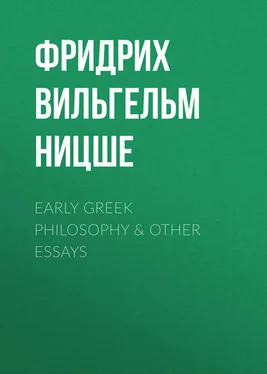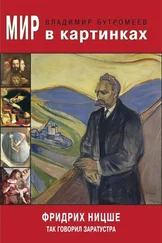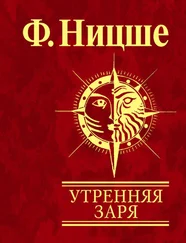Фридрих Ницше - Early Greek Philosophy & Other Essays
Здесь есть возможность читать онлайн «Фридрих Ницше - Early Greek Philosophy & Other Essays» — ознакомительный отрывок электронной книги совершенно бесплатно, а после прочтения отрывка купить полную версию. В некоторых случаях можно слушать аудио, скачать через торрент в формате fb2 и присутствует краткое содержание. Жанр: Философия, literature_19, foreign_antique, foreign_prose, на английском языке. Описание произведения, (предисловие) а так же отзывы посетителей доступны на портале библиотеки ЛибКат.
- Название:Early Greek Philosophy & Other Essays
- Автор:
- Жанр:
- Год:неизвестен
- ISBN:нет данных
- Рейтинг книги:3 / 5. Голосов: 1
-
Избранное:Добавить в избранное
- Отзывы:
-
Ваша оценка:
- 60
- 1
- 2
- 3
- 4
- 5
Early Greek Philosophy & Other Essays: краткое содержание, описание и аннотация
Предлагаем к чтению аннотацию, описание, краткое содержание или предисловие (зависит от того, что написал сам автор книги «Early Greek Philosophy & Other Essays»). Если вы не нашли необходимую информацию о книге — напишите в комментариях, мы постараемся отыскать её.
Early Greek Philosophy & Other Essays — читать онлайн ознакомительный отрывок
Ниже представлен текст книги, разбитый по страницам. Система сохранения места последней прочитанной страницы, позволяет с удобством читать онлайн бесплатно книгу «Early Greek Philosophy & Other Essays», без необходимости каждый раз заново искать на чём Вы остановились. Поставьте закладку, и сможете в любой момент перейти на страницу, на которой закончили чтение.
Интервал:
Закладка:
In his usual masterly manner Diels translates these lines with: "Das Sagen und Denken musz ein Seiendes sein. Denn das Sein existiert, das Nichts existiert nicht; das heisz ich dich wohl zu beherzigen." On the other hand in Fairbanks' "version" we read: "It is necessary both to say and to think that being is; for it is possible that being is, and it is impossible that not being is; this is what I bid thee ponder." In order to avoid a similar obscurity, throughout the paper on "EARLY GREEK PHILOSOPHY" I have rendered "das Seiende" (τὸ ἐὸν) with "Existent", "das Nicht-Seiende" with "Non-Existent"; "das Sein" (εῖναι) with "Being" and "das Nicht-Sein" with "Not-Being."
I am directly or indirectly indebted for many suggestions to several friends of mine, especially to two of my colleagues, J. Charlton Hipkins, M.A., and R. Miller, B.A., for their patient revision of the whole of the proofs.
M. A. MÜGGE. LONDON, July 1911.THE GREEK STATE
We moderns have an advantage over the Greeks in two ideas, which are given as it were as a compensation to a world behaving thoroughly slavishly and yet at the same time anxiously eschewing the word "slave": we talk of the "dignity of man" and of the "dignity of labour." Everybody worries in order miserably to perpetuate a miserable existence; this awful need compels him to consuming labour; man (or, more exactly, the human intellect) seduced by the "Will" now occasionally marvels at labour as something dignified. However in order that labour might have a claim on titles of honour, it would be necessary above all, that Existence itself, to which labour after all is only a painful means, should have more dignity and value than it appears to have had, up to the present, to serious philosophies and religions. What else may we find in the labour-need of all the millions but the impulse to exist at any price, the same all-powerful impulse by which stunted plants stretch their roots through earthless rocks!
Out of this awful struggle for existence only individuals can emerge, and they are at once occupied with the noble phantoms of artistic culture, lest they should arrive at practical pessimism, which Nature abhors as her exact opposite. In the modern world, which, compared with the Greek, usually produces only abnormalities and centaurs, in which the individual, like that fabulous creature in the beginning of the Horatian Art of Poetry, is jumbled together out of pieces, here in the modern world in one and the same man the greed of the struggle for existence and the need for art show themselves at the same time: out of this unnatural amalgamation has originated the dilemma, to excuse and to consecrate that first greed before this need for art. Therefore; we believe in the "Dignity of man" and the "Dignity of labour."
The Greeks did not require such conceptual hallucinations, for among them the idea that labour is a disgrace is expressed with startling frankness; and another piece of wisdom, more hidden and less articulate, but everywhere alive, added that the human thing also was an ignominious and piteous nothing and the "dream of a shadow." Labour is a disgrace, because existence has no value in itself; but even though this very existence in the alluring embellishment of artistic illusions shines forth and really seems to have a value in itself, then that proposition is still valid that labour is a disgrace – a disgrace indeed by the fact that it is impossible for man, fighting for the continuance of bare existence, to become an artist. In modern times it is not the art-needing man but the slave who determines the general conceptions, the slave who according to his nature must give deceptive names to all conditions in order to be able to live. Such phantoms as the dignity of man, the dignity of labour, are the needy products of slavedom hiding itself from itself. Woful time, in which the slave requires such conceptions, in which he is incited to think about and beyond himself! Cursed seducers, who have destroyed the slave's state of innocence by the fruit of the tree of knowledge! Now the slave must vainly scrape through from one day to another with transparent lies recognisable to every one of deeper insight, such as the alleged "equal rights of all" or the so-called "fundamental rights of man," of man as such, or the "dignity of labour." Indeed he is not to understand at what stage and at what height dignity can first be mentioned – namely, at the point, where the individual goes wholly beyond himself and no longer has to work and to produce in order to preserve his individual existence.
And even on this height of "labour" the Greek at times is overcome by a feeling, that looks like shame. In one place Plutarch with earlier Greek instinct says that no nobly born youth on beholding the Zeus in Pisa would have the desire to become himself a Phidias, or on seeing the Hera in Argos, to become himself a Polyklet; and just as little would he wish to be Anacreon, Philetas or Archilochus, however much he might revel in their poetry. To the Greek the work of the artist falls just as much under the undignified conception of labour as any ignoble craft. But if the compelling force of the artistic impulse operates in him, then he must produce and submit himself to that need of labour. And as a father admires the beauty and the gift of his child but thinks of the act of procreation with shamefaced dislike, so it was with the Greek. The joyful astonishment at the beautiful has not blinded him as to its origin which appeared to him, like all "Becoming" in nature, to be a powerful necessity, a forcing of itself into existence. That feeling by which the process of procreation is considered as something shamefacedly to be hidden, although by it man serves a higher purpose than his individual preservation, the same feeling veiled also the origin of the great works of art, in spite of the fact that through them a higher form of existence is inaugurated, just as through that other act comes a new generation. The feeling of shame seems therefore to occur where man is merely a tool of manifestations of will infinitely greater than he is permitted to consider himself in the isolated shape of the individual.
Now we have the general idea to which are to be subordinated the feelings which the Greek had with regard to labour and slavery. Both were considered by them as a necessary disgrace, of which one feels ashamed, as a disgrace and as a necessity at the same time. In this feeling of shame is hidden the unconscious discernment that the real aim needs those conditional factors, but that in that need lies the fearful and beast-of-prey-like quality of the Sphinx Nature, who in the glorification of the artistically free culture-life so beautifully stretches forth her virgin-body. Culture, which is chiefly a real need for art, rests upon a terrible basis: the latter however makes itself known in the twilight sensation of shame. In order that there may be a broad, deep, and fruitful soil for the development of art, the enormous majority must, in the service of a minority, be slavishly subjected to life's struggle, to a greater degree than their own wants necessitate. At their cost, through the surplus of their labour, that privileged class is to be relieved from the struggle for existence, in order to create and to satisfy a new world of want.
Accordingly we must accept this cruel sounding truth, that slavery is of the essence of Culture; a truth of course, which leaves no doubt as to the absolute value of Existence. This truth is the vulture, that gnaws at the liver of the Promethean promoter of Culture. The misery of toiling men must still increase in order to make the production of the world of art possible to a small number of Olympian men. Here is to be found the source of that secret wrath nourished by Communists and Socialists of all times, and also by their feebler descendants, the white race of the "Liberals," not only against the arts, but also against classical antiquity. If Culture really rested upon the will of a people, if here inexorable powers did not rule, powers which are law and barrier to the individual, then the contempt for Culture, the glorification of a "poorness in spirit," the iconoclastic annihilation of artistic claims would be more than an insurrection of the suppressed masses against drone-like individuals; it would be the cry of compassion tearing down the walls of Culture; the desire for justice, for the equalization of suffering, would swamp all other ideas. In fact here and there sometimes an exuberant degree of compassion has for a short time opened all the flood gates of Culture-life; a rainbow of compassionate love and of peace appeared with the first radiant rise of Christianity and under it was born Christianity's most beautiful fruit, the gospel according to St John. But there are also instances to show that powerful religions for long periods petrify a given degree of Culture, and cut off with inexorable sickle everything that still grows on strongly and luxuriantly. For it is not to be forgotten that the same cruelty, which we found in the essence of every Culture, lies also in the essence of every powerful religion and in general in the essence of power, which is always evil; so that we shall understand it just as well, when a Culture is shattering, with a cry for liberty or at least justice, a too highly piled bulwark of religious claims. That which in this "sorry scheme" of things will live ( i. e., must live), is at the bottom of its nature a reflex of the primal-pain and primal-contradiction, and must therefore strike our eyes – "an organ fashioned for this world and earth" – as an insatiable greed for existence and an eternal self-contradiction, within the form of time, therefore as Becoming. Every moment devours the preceding one, every birth is the death of innumerable beings; begetting, living, murdering, all is one. Therefore we may compare this grand Culture with a blood-stained victor, who in his triumphal procession carries the defeated along as slaves chained to his chariot, slaves whom a beneficent power has so blinded that, almost crushed by the wheels of the chariot, they nevertheless still exclaim: "Dignity of labour!" "Dignity of Man!" The voluptuous Cleopatra-Culture throws ever again the most priceless pearls, the tears of compassion for the misery of slaves, into her golden goblet. Out of the emasculation of modern man has been born the enormous social distress of the present time, not out of the true and deep commiseration for that misery; and if it should be true that the Greeks perished through their slavedom then another fact is much more certain, that we shall perish through the lack of slavery. Slavedom did not appear in any way objectionable, much less abominable, either to early Christianity or to the Germanic race. What an uplifting effect on us has the contemplation of the mediæval bondman, with his legal and moral relations, – relations that were inwardly strong and tender, – towards the man of higher rank, with the profound fencing-in of his narrow existence – how uplifting! – and how reproachful!
Читать дальшеИнтервал:
Закладка:
Похожие книги на «Early Greek Philosophy & Other Essays»
Представляем Вашему вниманию похожие книги на «Early Greek Philosophy & Other Essays» списком для выбора. Мы отобрали схожую по названию и смыслу литературу в надежде предоставить читателям больше вариантов отыскать новые, интересные, ещё непрочитанные произведения.
Обсуждение, отзывы о книге «Early Greek Philosophy & Other Essays» и просто собственные мнения читателей. Оставьте ваши комментарии, напишите, что Вы думаете о произведении, его смысле или главных героях. Укажите что конкретно понравилось, а что нет, и почему Вы так считаете.


![Фридрих Ницше - Песни Заратустры [сборник]](/books/28216/fridrih-nicshe-pesni-zaratustry-sbornik-thumb.webp)








